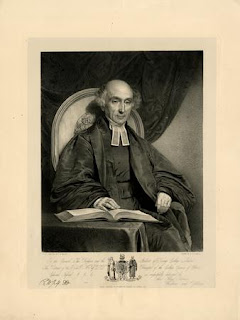"Supplemental to the means of grace properly so called": Jelf's Bampton Lectures and those ordinances which are not Sacraments of the Gospel
Jelf here presents a Laudian understanding, significantly distinct from the direction in which Tractarianism was developing. To begin with, those ordinances reverently administered by the Church of England, such as Confirmation, "approximating to the rank of proper means of grace", are not to be regarded as Sacraments of the Gospel.
The key term is "approximating". It is echoed in the use of "subsidiary". These ordinances, unlike the Sacraments of the Gospel, follow apostolic practice (they are not of dominical institution) or have "traces" in the Scriptures. Because they lack "the express evidence of God's written Word", they may only be "almost essential" (emphasis added).
This reflects the approach taken by Cosin in his account of the Church of England's disagreements with the Tridentine teaching that "That Christ hath instituted seven true and proper Sacraments in the New Testament". By contrast, Cosin referred to "the reception and use of the two blessed Sacraments of our Saviour", followed by descriptions of the ordinances of Confirmation, Matrimony, Ordination, Absolution ("in public or private"), and "visiting the sick by praying for them and administering the blessed Sacrament to them together with a final absolution of them from their repented sins": no claim whatsoever was made that these ordinances were sacraments.
Also of importance is how Jelf places them alongside other usages which have different "shades of value". While the ordinances in question had a value considerably greater to the Christian life than those usages which are "absolutely indifferent", it remains the case that they belong to this category of rites rather than Sacraments of the Gospel.
Finally, also thoroughly Laudian is the reverence Jelf encourages for these rites and usages. The fact that they are neither Sacraments nor required by Scripture does not mean these rites and usages can be disregarded or rejected: they contribute to "the harmonious development of the religious life". Here, then, was the Laudian joy in and defence of the ordinances, rites, and ceremonies which were the "laudable Practice of the Church of England, or indeed of the whole Catholick Church of Christ".
It is evident, however, that, besides these principal instruments so revealed, there are others, either concurrent with their operation, or else subsidiary, either directly or collaterally, to their right employment and full effect; usages and ordinances, not resting on the express evidence of God's written Word, but either, from the very first, demonstrably established by the Apostles themselves, with traces more or less distinct in Scripture, or else, at some indefinite time, mediately sanctioned by God, through His Church, and, by His appointment, conducive, in their degree, to edification.
Now these ordinances, it will appear at once, are very numerous, and differ greatly as to their relative value; some approximating to the rank of proper means of grace, as, for instance, the rite of Confirmation; others, such as Liturgical forms, of great moment, because necessary or auxiliary to the means properly so called; and others again, such as ecclesiastical habits, sacred architecture, Church music, and the like, remotely influencing the mind or feelings of the worshipper, and serving, more or less, to the harmonious development of the religious life.




Comments
Post a Comment